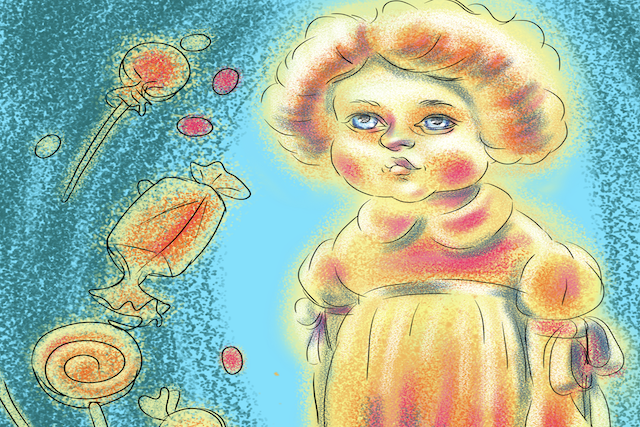
I went on my first diet when I was around fourteen or so because, as they often do in growing teens, my jeans started getting tight.
And because I grew up in the same anti-fat culture we all have, I hated myself for it.
Around the same time, an adult in my life who was always obsessed with “eating healthy” gave me a copy of the new book she was reading outlining the healthiest way to eat.
It was a book on the Atkins/low-carb diet.
The author spent the bulk of the book demonizing carbs, explaining in convincing-sounding detail all the science he supposedly had about not only how harmful carbs were but how they were the cause of weight gain.
Three things happened from reading that book.
1. I became scared of eating carbs and started trying to eliminate them because, while of course I wanted to be healthy, I was terrified of gaining weight.
2. Instead of losing the five pounds or so that I wanted to lose, I gained about five pounds and a slow progression of weight gain continued for years. Because the harder I tried to eliminate the carbs, the more I craved and obsessed over them; always eventually caving, eating them, and then hating myself for it and promising to start “being good tomorrow.
Eventually the caving led to overeating them because “as long as I was being bad anyway, I may as well eat them all and get them out of the house so I won’t be tempted when I start being good again.”
3. An almost three-decades-long war with my weight, my body, myself, and food began. A war that resulted in a hospitalization in my early thirties, after my first foray into the world of “it’s not a diet; it’s clean, healthy eating,” for bulimia so severe I often felt like I was going to eat myself to death.
And the whole time, I blamed myself for it. I believed I was stupid, weak, pathetic, a pig who needed to try harder to control myself.
So I kept trying. For more than half my life I tried, and it almost killed me.
I’ve been working with women around the whole weight and food thing in one form or another for over fifteen years now. I started sharing my story because after listening to other women describe their histories with food and weight, I realized that my story is not unique.
Varying degrees of my story are the norm, and they all start in basically the same seemingly innocent ways.
We want to lose weight or “eat healthier,” so we do what we’re taught we’re supposed to.
We start a diet or “healthy eating plan” of some sort that tells us what we “should” and “shouldn’t be” eating. This leads to a lifetime of trying to control our intake and our bodies, which results in disordered eating patterns, weight cycling, and self-loathing.
I regularly hear from women in their seventies or eighties who have spent their entire lives fighting this losing battle with themselves to “eat right” and lose weight.
In one survey of US women a few years ago, 75% reported disordered eating behaviors or symptoms consistent with eating disorders.
My recovery didn’t start until I realized a few basic truths.
First, if I had any hope of healing, I had to figure out what was causing my eating issues. Ultimately, it came down to my conditioning: patterns of thoughts, beliefs, and behaviors that had developed over the course of my life as a result of many different things, not the least of which being:
1. The stories I had learned to believe about bodies and the people in them: Big ones are bad, unhealthy, undisciplined, and lazy. Small ones are good, healthy, and disciplined, and they work hard.
These misguided beliefs taught me not only to live in fear of weight gain and the harsh judgment of others if I gained weight, but also to judge myself and my body harshly when I did so. This contributed to not only the decades of weight gain and disordered eating but ultimately the eating disorder.
2. The stories I’d learned about food: These are the good foods, the healthy foods, the foods you should be eating, and those are the bad foods, the unhealthy ones, the ones that cause all manner of disease, poor health, and weight gain. Those are the foods you have to give up forever, or only allow in moderation.
These misguided beliefs taught me to live in fear of food and my body becoming unhealthy or fat if I dared to eat the “wrong” thing. This created the never-ending pattern of promising myself I was going to “be good” only to end up craving, caving, hating myself, and starting over that I felt trapped in for so many years.
3. Disconnection with myself, my body, and my own needs: As long as I was trying to make myself eat or do the things I thought I “should” do in order to control my body and my food intake, I was stuck in my head. Stuck in fear. Disconnected from myself, my body, and even the decision-making part of my brain. Ruminating, promising, obsessing, hating.
In that state, I had no ability to understand the messages my body was constantly sending me about what it needed, nor did I have any concept that my body was something that could be trusted to tell me that. I saw it as an enemy to be ruled over, controlled, and beaten into submission… rather than the ally, healer, and communicator that it is.
4. Self-loathing: I didn’t like, love, trust, or value myself, so my entire self-worth and relationship with myself relied on what my body looked like and my need to control how others saw me.
The second truth I had to realize: if I had any hope of recovering and making peace with myself, my body, and food, I had to change the things that were causing the war.
That meant giving up the obsession with my weight and eating or looking perfect.
I had to recognize those things for what they were—distractions that kept me from dealing with the issues that were causing the problems in the first place and were making matters worse.
So I put all my energy into changing the causes.
It didn’t happen overnight, but one day I realized I couldn’t remember the last time I’d engaged in compensatory behaviors. The binges were getting fewer and farther between.
And then I couldn’t remember the last time I binged or even overate, and I couldn’t even imagine ever doing it again.
It’s been many years since those things were my daily reality, and I’m thrilled to say they simply don’t exist in me anymore because I changed the conditioning that was causing them. I learned to reconnect with and trust my body when it tells me what it needs or wants, and I learned to value myself enough that I cannot imagine treating myself or my body poorly anymore.
Recovery and peace are blessings that I don’t take for granted for a second and I’m still grateful for every minute of the day.
But disordered eating and eating disorder recovery are unbelievably difficult, prone to multiple relapses, and many aren’t so lucky.
This brings me to my main points because the simplest solution to disordered eating or eating disorder recovery is to prevent those things from ever starting in the first place.
That’s my dream, to save future generations from growing up with the disordered eating patterns/eating disorders and horrible body/self-images that ours has grown up with.
It starts with us, as parents.
What I Wish Parents Understood
Living with disordered eating patterns or an eating disorder is a special kind of hell that I wouldn’t wish on anyone.
It’s like living with the meanest, most self-destructive monster in your head one can imagine.
You know the things you’re thinking and the choices you’re making are harming you, you know they’re making you miserable, you’re desperate to stop, and yet… no matter how hard you try, you can’t.
You feel powerless. Hopeless. Helpless. Trapped.
Recovery was one of the hardest things I’ve ever done in my life—and I’ve not had an easy life, so that says a lot.
Given this, it’s my view that in addition to helping those struggling recover, prevention at an early age needs to be a top priority.
And parents, I’m not trying to place blame, but after fifteen years of hearing women talk about their struggles, I’ve come to realize that we are often a big part of the cause, although not purposely of course.
We all have our kids’ best interests in mind.
We want our kids to be the healthiest, most confident versions of themselves, and we’re all doing the best we can to help them get there.
We want them to maintain healthy bodies and eat nutritious foods. Nobody doubts that we all want the best for our children and are doing our best.
But the way we’re approaching it is almost guaranteeing that our kids are going to struggle with the same food issues, eating disorders, or a lifetime of disordered eating and failed diet attempts that so many in our generation have.
They’re learning to fight the same wars we have in the same ways we learned to fight them.
All the things we typically do to try to help encourage health (restricting “bad” foods, teaching them that some are “good” and some are “bad,” encouraging them to lose weight or even acknowledging their weight) are among the worst things we can do for the health of our children.
It’s difficult to overstate the damage that weight and food shame does to adults, and that damage is worse in children.
We also have to remember that they learn from us. If your kids watch you struggle with food and your weight, if they see you tie your mood and your self-worth to your scale, they are going to be at a significantly higher risk for developing an eating disorder or living with those same struggles themselves.
So this is what I want parents everywhere to know: encouraging weight loss, labeling or restricting their food intake (good vs bad, allowed vs not allowed), discussing weight, restricting foods, and dieting yourself—all of those things that millions of us are doing every single day that diet and healthy eating cultures have taught us is expected or accepted—they’re putting our children at risk.
Research has shown that the younger girls are when they go on their first diet, the more likely they are to engage in extreme weight control behaviors like vomiting and laxatives (that’s an eating disorder), abusing drugs and alcohol, and becoming overweight by the time they reach their thirties.
One out of four dieters will develop some type of eating disorder. That’s a number that’s doubled in the last twenty years. And the majority of the rest develop very disordered eating patterns.
Eating disorders are widely recognized to have the highest mortality rate of all mental illness, while also being among the most underdiagnosed and under/poorly treated.
Not even to mention the levels of anxiety, depression, and self-loathing that typically come from years of living with disordered eating and battling with our weight.
There is a better way.
Encouraging Healthy Choices Without the Risk
DON’Ts
Don’t discuss weight, size, or bodies—not yours, not theirs, not anyone else’s.
Don’t let other people discuss their weight in front of them—not their doctor, not relatives, no one.
Don’t label foods—no good, no bad, no healthy, no unhealthy… no food labels. At all. Binary food labels can cause shame, create self-punishing behaviors, destroy our relationship with food, and contribute to overeat/binge/restrict cycles that can take years to heal.
Don’t tell them they are what they eat—our food choices don’t determine our worth.
Don’t restrict foods—let them eat what they want. Restriction leads to guilt, shame, overeating, or bingeing and fuels disconnection.
Don’t force exercise or “burning off calories”—encouraging exercise as a means of weight loss is setting them up for trouble.
DOs
Do encourage them to consider how their food choices make their body feel. How does that big mac and fries make their body feel when they’re done eating? What about the candy for breakfast? Do they feel good when they’re done eating? Or do they feel sick? Would they rather feel good, or sick? How does skipping a meal make their body feel? Do they want to feel that way? Do they really want to ignore their body’s most basic human needs with restriction? Why?
Do encourage them to consider why they’re eating. Are they physically hungry? No? Are they emotionally hungry? Teach them the difference and help them learn to accept, honor, and express the emotions they’re trying to feed or soothe rather than ignore or numb them.
Do teach them the value of understanding the why behind the choices they’re making and how their choices are often a result of their relationship with themselves.
Do teach them that the relationships they have with themselves, food, and their bodies are the most important relationships they’ll ever have in their lives and to protect and nurture them.
Do lift them up, teach them to value themselves exactly as they are, for who they are, not what they look like, weigh, or how they eat. Teach them to value and respect others, no matter what size they are.
Do teach them about self-acceptance, kindness, authenticity, self-compassion, and the power of mindful living.
Do teach them to appreciate the wonder and magic of their bodies, no matter what size they are. Teach them how to stay present in the moment and in their bodies, so they learn to listen to and trust their own bodies.
Do teach them humans come in all shapes and sizes—and that no one shape or size is any better than another.
Teach them that they are enough, exactly as they are, and that neither their bodies nor their food choices define their worth.
And that will all be way easier if you learn it for yourself first.
About Roni Davis
Drawing on her own healing process plus over a decade of professional knowledge, education, and experience, E-CET founder Roni Davis guides women through the process of uncovering and changing the thought and behavior patterns that cause weight and food struggles. Her clients break unhealthy eating habits and heal their relationships with food and their bodies while learning to approach their overall well-being from a place of connection, self-trust, compassion, and love. Learn more with her free Why We Eat video series.
- Web |
- More Posts













 Though I run this site, it is not mine. It's ours. It's not about me. It's about us. Your stories and your wisdom are just as meaningful as mine.
Though I run this site, it is not mine. It's ours. It's not about me. It's about us. Your stories and your wisdom are just as meaningful as mine.
Roni, thank you for this article. I felt like you were writing about my experience. I still struggle. Fortunately, my husband is very supportive and says my obsession is a waste of time. I agree with him. I hope through this newsletter that I can find a way to get over this issue. Even though I am not a parent, I agree with all of your “do’s and don’ts” for parents. I taught elementary P.E. for 18 years. It wasn’t uncommon some of my 4th grade girls to skip lunch and start on a diet. Dr. Oliver at NMSU has done a lot of research on this subject particularly the body image issue and its place in P.E. Her work is brilliant.
Hi Roni, great article! Thank you for sharing your thoughts and experiences. Congratulations on your recovery.
The reality of the US and similarly in other countries is that 71% of people are overweight by the time they hit 20. The media focuses on the 29% of people who haven’t experienced fluctuations in their weight yet. The key word being yet.
I think it’s important to consider the effects of food poverty, hours worked (the average is 47 in the US, which is very high compared to other countries), and also job type. Which jobs have the highest salaries, how active are these jobs? Not to mention, are there any health conditions or medications that make managing weight more difficult?
It’s important for society to make us feel like we’re the ones that are failing and we are to blame, but society is the cause of these issues.